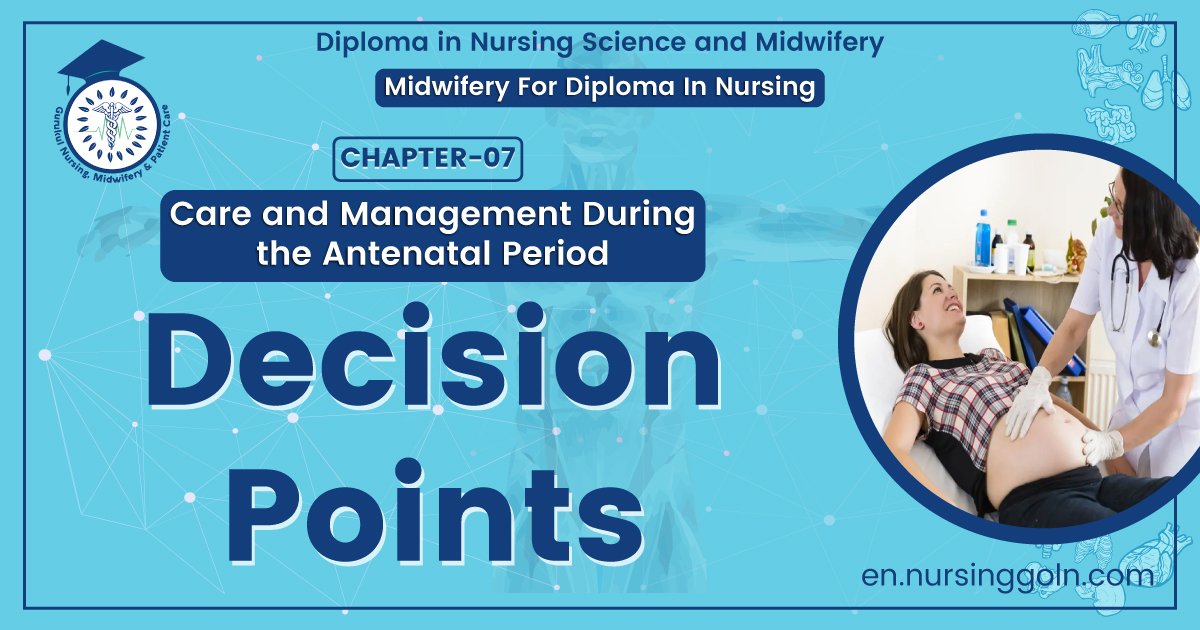Decision points – This course is designed to understand the care of pregnant women and newborn: antenatal, intra-natal and postnatal; breast feeding, family planning, newborn care and ethical issues, The aim of the course is to acquire knowledge and develop competencies regarding midwifery, complicated labour and newborn care including family planning.

Decision points
Decision points
hood via 10 gloss and
Decision points for midwifery care are the time in the woman’s pregnancy when there
ought to be an assessment. Each woman is an individual with different needs.
Why have decision points:
1. Provides a systematic framework for organizing care.
2. Is based on 4 to 6 timeframes associated with gestation periods.
3. Consists of cues that provide a guiding framework and structure for the midwife.
4. Categories include cues about information sharing assessment and examination, testing and screening, active decision making, as well as health promotion/information and education.

Preparation for Parenthood
transition to parenthood includes changes in life roles and taking steps to manage such changes.
New or expectant parents and others can prepare for parenthood by considering skills, tasks,
experiences and resources that can assist in becoming a parent.
Becoming a Parent
Some have suggested that parenting is the hardest job any person ever will have! It also seems to be the job we are often the least prepared to begin. Becoming a parent means tour lives are changing and we must prepare for those changes. For example, an expectant mother must learn 100 about and prepare for the physical changes she will experience during pregnancy.
Perhaps even more important for those becoming parents are to think about and prepare for the mental and emotional changes or challenges that occur when a child is born. Becoming a parent is marked by a series of changes in the life of a mother or father. These changes can be wonderful and challenging. Some of f the positive aspects s of of a child’s, entrance into a family can include
a. Uniqueness of a child – Babies are each special and unique. Parents can learn to enjoy each new word, little step or cute expression.
b. Dimensions of love – The birth of a child offers parents a parents a whole new, experience in love that can be deep and powerful.
c. Feelings about oneself – Although some new parents s may have doubts, many parents also come to feel more mature and responsible with a child. Successfully raising a child is a
source of accomplishment and meaning,
d. Sense of family – Children often help create a new sense of family connection among family members
e. Personal growth – Parenthood provides the opportunity to guide, teach and pass on values to the next generation.
f. Closeness to parents – Having a child may help new parents understand their parents love and perspectives.

The Role of Parenthood
Becoming a parent involves taking on a new role in life. You never may have played the role of “parent” on the stage of life before. What will it be like? How will it differ from being in the role f “spouse/partner,” “student” or “worker”? Typically, you will have some sense that roles are changing in your life when a child is born. This may differ somewhat for men and women an Research on becoming a parent has shown that the importance of roles related to a sense of yourself will change with a child’s birth. How do things change?
Men and women were asked to describe how much different roles contributed to their sense of themselves before and after parenthood. On average, a person’s “partner/spouse aspect after a child is born goes down for men and women. A person’s “parent” aspect goes up significantly for men and women. A person’s “worker/student” aspect goes up for men and down for women.
This may vary individually for specific men or women-need New parents should expect and plan to adjust to these role changes in their life and relationships. You may be spending much less time in the “worker” role and much more time in the “parent” role. Or you may find yourself thinking less about your partner role and spending more time worrying about your “parent” role.
In thinking about the transition to the role of being a parent, explore two key questions:
1. What will you be doing as a parent? boots
2. What changes can you expect to occur in your life and relationships?
Read More….
